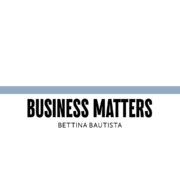Reduce and reuse single-use plastics

Our oceans are essential for humankind and the planet. This Oceans Month, we must reflect on their profound importance on life on Earth, and how industrial production and corporate consumption of resources have affected them. The gravity of the problem calls for systemic solutions—not just for marine ecosystems but for communities that rely on them.
Single-use plastic—from sachets to sando bags and disposable cups—has led to an astonishing accumulation of harmful waste in our oceans. According to the United Nations Environment Program, one million plastic bottles are bought every minute, and around five trillion plastic bags are used every year.
In the Philippines, around 164 million sachets are used daily. Study after study have shown how plastic results in overwhelming pollution in our communities and bodies of water. Anywhere from 75 to 199 million tons of plastic are currently in our oceans, and one study approximates that at least 5 trillion plastic particles are floating in those waters. Coral reefs and marine wildlife are choking on plastic, while plastic waste finds its way to even the deepest ocean trench.
By extension, the overproduction of plastic also hurts fisherfolk and coastal communities that benefit from healthy seas. This threatens our food security, as seafood comprises around 42 percent of Filipinos’ animal protein intake. This is on top of fisherfolk already struggling with climate change.
Because coastal communities, low-income groups, populations living near production facilities, and fisherfolk, among others, bear the brunt of plastic pollution, the fight against single-use plastic is not only an environmental issue but one of social justice as well.
Destructive industries, fossil fuels, and plastic pollution are already costing us so much in environmental degradation, food insecurity, health problems, and livelihood disruptions. If corporations and oligarchs continue to operate as they’ve done for decades, with little or no accountability for the environmental crises they cause, the price paid by communities and oceans will be even higher in the next decades.
It is thus necessary for governments and corporations to change systems, with policies and business models reducing plastic production and use. The widespread adoption of reuse systems as alternatives to single-use plastic is one of the most promising solutions for our oceans. Yes, we need to ban single-use plastic like sachets, but we have to make sure it involves a just transition. People using sachets and other kinds of plastic will need alternative systems, like reuse and refill solutions.
If done right, reuse and refill can be made affordable, safe, accessible, and just, replacing sachets without affecting consumers. This way, no one gets left behind in our transition away from single-use plastic toward a sustainable and plastic-free future. By rethinking business models to revolve around reuse systems, we can significantly cut down on single-use plastic that end up in our oceans, while also building a thriving economy and a greener future.
Unlike recycling, reusing will not generate waste and offers more sustainable options to communities. Reuse systems can create jobs, start new business ventures, and provide opportunities for waste workers and other community stakeholders. Systems with reusable containers or packaging, refill stations, and take-back schemes create a circular economy that helps us save resources, while reducing waste management costs and preventing negative impacts from plastic pollution. It’s a solution not just for the oceans, but for all.
At the end of the day, the choices made by leaders and businesses will determine whether we move toward real solutions or sink deeper into crisis. The government must take decisive action by legislating the shift to reuse and refill systems, with clear targets and timelines for phasing out harmful sachets and other single-use plastic.
This could start with strengthening the extended producer responsibility law to prioritize reduction and reuse, and not just waste collection. Complementarily, corporations must do more beyond sustainability pledges. They must redesign their business models around reuse and refill, ensuring these solutions are accessible, affordable, and just.
Because in doing so, we don’t just reduce plastic waste. We build healthy communities, champion a just transition, and protect the oceans and our environment for generations to come.
Marian Ledesma is a zero-waste campaigner at Greenpeace Philippines. She has been participating in the global plastics treaty negotiations as part of the international delegation of Greenpeace.

















